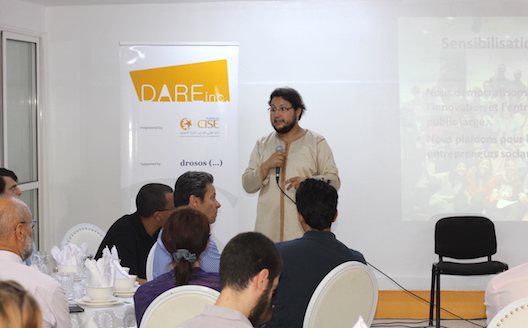How this social entrepreneurship coworking space could change Morocco


Don't let the basic interior fool you. Dare Space has huge
potential. (Image via Hind Touissate, Dare Space)
With its bare walls and basic desks, this space may not seem like much but it could have a huge impact on Morocco.
On Wednesday June, 30 the Moroccan Center for Innovation and Social Entrepreneurship (MCISE) open the doors of its coworking space, Dare Space, in Rabat.
Dare – which also means “do” in the Moroccan dialect – is not just a workspace. It’s a place for entrepreneurs to develop their ideas. They can have meetings, attend events, use the FabLab and join its incubation program.
The watchword is collaboration
Launched in 2012 to promote social change in Morocco through economically viable enterprise, the MCISE has seen its share of impact entrepreneurs. Many of them complained they needed a physical space to meet, says MCISE founder Adnane Addioui.
Usually seen wearing a traditional jellaba, Addioui was the runner up for Wamda’s Karim Jazouani prize, which rewarded Morocco’s best entrepreneurship advocates for their impact, for his work as MCISE’s founder and Enactus’ country manager.
Addioui wanted Dare Space, right in the center of Rabat, to be simple so that entrepreneurs can make it theirs. The space was designed to be physically and financially accessible to young social entrepreneurs, but also associations and more traditional communications and web design companies.
“We need diversity to innovate,” says Eric Asmar, Dare Inc.’s director.
Dare Space can accommodate 45 workers. Priority is given to those in the incubation program but only a small group is usually there full-time, which leaves 25 to 30 workstations available for others to use.

Dare Inc.’s team relaxing after work (left to right: Jamal
Touissi, Oussayd Bouayad, Eric Asmar, and Ilyas Aaqaou)
The space will offer entrepreneurship and social innovation training, coding workshops, prototyping sessions (once the Fab Lab opens at the end of summer), art exhibits and conferences.
It will also be the center of activities for Dare Inc., its incubation program for high impact entrepreneurship projects.
Dare Inc.: supporting companies on a mission
Twice a year, Dare Inc. will back 30 entrepreneurs who are looking for innovative and viable solutions to Morocco’s biggest challenges.
Launched in May 2015, the first round included 22 high-impact startups. They are receiving mentorship and financial help, either directly through a 30,000 dirhams infusion (around $3,000) for the youngest projects, or indirectly through Dare’s national and international investors’ network. An upcoming crowdfunding platform will support more mature projects.
There are three tracks for startups to follow. In the first track, entrepreneurs learn to develop an idea and a prototype in two months; in the second track they learn to deploy a minimum viable product, a business model, and to create their legal entity within three months; and in the third track they learn to come up with a revenue model and attract investors, also within three months. Startups can automatically and for no additional cost join all three tracks, making their program lasts up to eight months. The program is flexible.
“We don’t believe in organized programs, we don’t have a standard program, nor modules,” says Addioui. “We define the needs, and then the results.”
Program participants don’t have to spend anything to benefit from the program and the workspace, they have to choose between giving Dare Inc. 5 percent of their equity or 2 percent of their profits annually.
Up until now, the MCISE has been self-funded thanks to its consulting activities. For this program, the organization raised money from Swiss Drosos Foundation to ensure the functioning of the program and the space the two first years. Dare Inc. hopes to raise an additional $950,000 to launch its second phase and incubate 60 social startups each year for the next five years.

Adnane Addioui kicking off Dare Space.
The impact could be huge. Like many other incubators, Dare Inc. aims to help young startups grow and create jobs – they believe 60 companies can create a thousand jobs – but given its social vocation, those companies could also offer solutions to economic and environmental challenges the country is facing.
From training to agriculture
Dare Space’s kickoff event served as an opportunity to introduce three of the 22 incubated startups.
GoMobile, led by Othmane Bekkari, allows anyone to access, interact and create content through simple phone calls and interactive vocal servers.
Aboubakr Jeddioui’s Talibjob helps young Moroccans find internships.
And Hanane Rifai’s Hydrobarley is creating feed that will ease farmers’ life.
For those entrepreneurs, Dare Inc. already has had a great impact.
“This program gave me concrete tools to help me structure my project […], develop our business model, and hone our customer knowledge,” Bekkari said. “Dare Inc. also enabled us to join a network of social entrepreneurs and to identify potential synergies and partnerships.”
The effect is already snowballing. A second incubator is to open in the fall. After Paris, San Francisco, Santiago, Tunis, and more, Comptoir de l'Innovation will open its incubator’s doors in Casablanca to help tech and/or environmental seed projects with social or environmental impact. The call for projects will be launched end of the summer. Six projects will incubated for a year, six more will join six weeks later.


